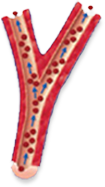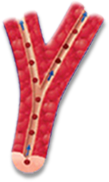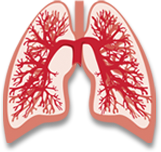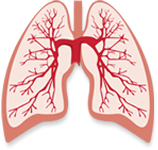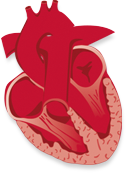What is pulmonary arterial hypertension (PAH)?
- PAH is high blood pressure in the blood vessels of the lungs, which is different than ordinary high blood pressure that can occur throughout the body
- In PAH, the blood vessels in the lungs become narrow and stiff. This creates more pressure in these arteries, making it more difficult for blood to flow through them, which means the heart has to pump harder to push blood through them
- This causes the most common symptoms of PAH, such as shortness of breath, feeling tired or worn out, chest pain, and dizziness and/or fainting
- People with PAH may find it difficult to complete activities, such as climbing stairs or walking up an incline
How does PAH affect the heart and lungs?
In PAH, high blood pressure in the blood vessels of the lungs affects the ability of the heart and lungs to work properly. Here is how the blood vessels, lungs, and heart function normally compared with those affected by PAH.
Healthy blood vessels
The blood vessels in the lungs are wide enough so blood can flow through them freely.
PAH-affected blood vessels
The blood vessels in the lungs become narrow, making it difficult for blood to flow through them.
Healthy lungs
As the blood flows through the blood vessels in the lungs, it picks up the oxygen it needs to deliver to the rest of the body.
PAH-affected lungs
Because the blood vessels are too narrow, less blood is able to pass through the lungs and carry oxygen to the rest of the body.
Healthy heart
The heart pumps normally to push blood through the blood vessels in the lungs.
PAH-affected heart
The heart has to pump harder to push blood through the lungs. This puts tremendous stress on the heart, and it weakens over time.
Important Safety Considerations for ADCIRCA® (tadalafil)
- You should discuss all of your medical conditions and all medications with your healthcare provider before starting ADCIRCA
- Do not take ADCIRCA if you take any medications that contain nitrates (often used for chest pain) or guanylate cyclase stimulators, as the combination could cause a sudden, unsafe drop in blood pressure
- Do not take ADCIRCA if you are allergic to tadalafil or any other ingredient in ADCIRCA
- ADCIRCA is a type of medication called a phosphodiesterase 5 inhibitor (PDE-5i) that can cause blood vessels to widen, which may result in a decrease in blood pressure. If you have heart-disease or any problems with low blood pressure, tell your healthcare provider before taking ADCIRCA, as these conditions may be affected by the action of ADCIRCA
- Talk with your healthcare provider if you are pregnant or planning to become pregnant or if you are breastfeeding or plan to breast feed.
- If you have ever had blockage in the veins of your lungs, known as pulmonary veno-occlusive disease (PVOD), ADCIRCA is not recommended for you
- Taking ADCIRCA with alcohol, or blood pressure medications, such as alpha-blockers, may lower blood pressure and cause hypotension (light-headedness or fainting)
- Do not take ADCIRCA if you are taking rifampin (an antibiotic for certain bacterial infections), or antifungal medications, such as ketoconazole and itraconazole. If you require treatment with both ADCIRCA and ritonavir (Norvir®) at the same time, your dose of ADCIRCA will need to be adjusted. Inform your healthcare provider if you have kidney or liver problems before taking ADCIRCA
- ADCIRCA contains the same ingredient (tadalafil) as Cialis®, which is used to treat erectile dysfunction (ED, impotence) and the signs and symptoms of benign prostatic hyperplasia (BPH, enlarged prostate). If you are taking ADCIRCA, do not take Cialis or other PDE-5is
- In rare cases, patients reported side effects such as decreased eyesight or loss of vision in one or both eyes (NAION), or sudden decrease or loss of hearing, sometimes with ringing in the ears and dizziness. If you experience any of these side effects after taking ADCIRCA, seek medical attention right away
- In rare cases, men taking PDE-5is (including tadalafil) for erectile dysfunction reported side effects such as an erection lasting more than four hours. If you experience a prolonged erection, seek medical attention right away
- The most common side effects of ADCIRCA are headache, muscle pain, getting red or hot in the face (flushing), nausea, pain in the arms, legs or back, upset stomach, stuffy or congested nose
ADC.ISI.CON.SEP2020
For more information about ADCIRCA, please see the
Full Prescribing Information
and
Patient Information
or call 1-800-545-5979.
Call your healthcare provider for medical advice about side effects. You are encouraged to report negative side effects to the FDA at www.fda.gov/medwatch or call 1-800-FDA-1088.
